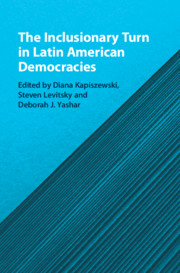Book contents
- The Inclusionary Turn in Latin American Democracies
- The Inclusionary Turn in Latin American Democracies
- Copyright page
- Contents
- Figures
- Tables
- Contributors
- Acknowledgments
- Prologue: Reflections on Two Episodes of Popular Inclusion
- 1 Inequality, Democracy, and the Inclusionary Turn in Latin America
- Part I Extending Social Policy and Participation
- Part II Inclusion and Partisan Representation
- Part III New Party–Society Linkages
- Part IV Inclusion, Populism, and Democracy
- References
1 - Inequality, Democracy, and the Inclusionary Turn in Latin America
Published online by Cambridge University Press: 12 January 2021
- The Inclusionary Turn in Latin American Democracies
- The Inclusionary Turn in Latin American Democracies
- Copyright page
- Contents
- Figures
- Tables
- Contributors
- Acknowledgments
- Prologue: Reflections on Two Episodes of Popular Inclusion
- 1 Inequality, Democracy, and the Inclusionary Turn in Latin America
- Part I Extending Social Policy and Participation
- Part II Inclusion and Partisan Representation
- Part III New Party–Society Linkages
- Part IV Inclusion, Populism, and Democracy
- References
Summary
This chapter examines the movement toward greater inclusion across Latin America over the last three decades. It introduces three dimensions of inclusion: official recognition of historically excluded groups; access to policymaking; and resource redistribution. It shows how the rate of adoption of reforms on all three dimensions has increased across the region since the 1990s. The chapter then seeks to explain the inclusionary turn. It argues that the combination of long-standing social inequalities and the endurance of democratic institutions created both incentives and unprecedented opportunities to adopt inclusionary reforms. The chapter examines factors – such as left government, social mobilization, electoral competition, and natural resource wealth – that explain variation within the inclusionary turn. We then explore some of the important trade-offs and limitations inherent in inclusionary reform, including tensions between inclusionary policy initiatives and liberal democratic institutions, the various limitations imposed by state weakness, and the trade-offs associated with using the state to promote participation. We conclude by examining the sustainability of inclusionary reform in Latin America, focusing on the centrality of the state in ensuring that inclusionary reforms that are written into parchment are actually implemented, enforced, and sustained in practice.
Keywords
- Type
- Chapter
- Information
- The Inclusionary Turn in Latin American Democracies , pp. 1 - 56Publisher: Cambridge University PressPrint publication year: 2021
References
- 5
- Cited by



